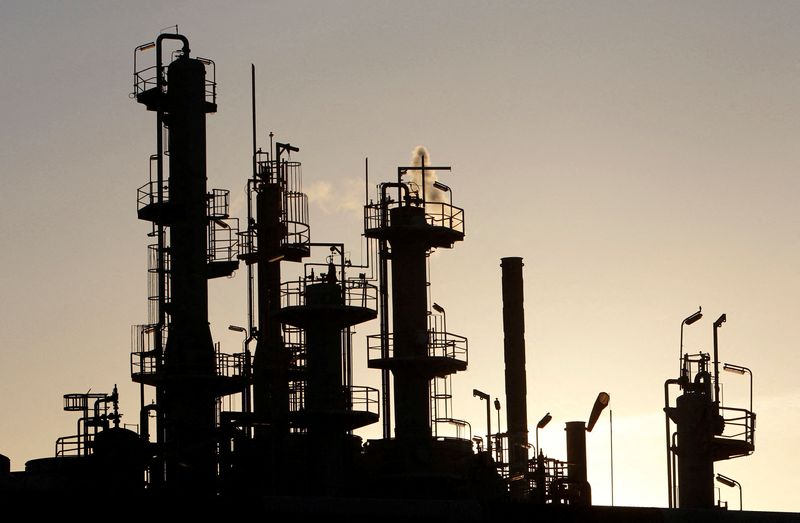
FILE PHOTO: Towers and smokestacks are silhouetted at an oil refinery in Melbourne June 21, 2010. REUTERS/Mick Tsikas/File Photo
January 28, 2022
By Yuka Obayashi
TOKYO (Reuters) – Oil prices rose on Friday, set for their sixth weekly gain, amid concerns of tight supplies as major producers continue their policy of limited output increases amid rising fuel demand.
Brent crude futures climbed 49 cents, or 0.6%, to $89.83 a barrel at 0310 GMT, after falling 62 cents during the previous day. However, prices did reach $91.04 earlier in that session, the highest since October 2014.
U.S. West Texas Intermediate (WTI) crude futures rose 62 cents, or 0.7%, to $87.23 a barrel, having declined 74 cents on Thursday. WTI also reached a seven-year high of $88.54 earlier in the session.
Both Brent and WTI are set to rise for a sixth week, the longest weekly streak since October, when Brent prices climbed for seven weeks while WTI gained for nine.
This year, prices have gained about 15% amid geopolitical tensions between Russia, the world’s second-largest oil producer and a key natural gas provider to Europe, and the West over Ukraine as well as threats to the United Arab Emirates from Yemen’s Houthi movement that have raised concerns about energy supply.
“Where Brent crosses $90 level, we see some selling from a sense of accomplishment, but investors start buying again when the prices fall a little as they remain cautious about possible supply disruptions due to rising geopolitical tensions,” said Tatsufumi Okoshi, senior economist at Nomura Securities.
“The market expects supply will stay tight as the OPEC+ is seen to keep the existing policy of gradual increase in production,” he said
The market is focusing on a Feb. 2 meeting of the Organization of the Petroleum Exporting Countries (OPEC) and allies led by Russia, a group known as OPEC+.
OPEC+ is likely to stick with a planned rise in its oil output target for March, several sources in the group told Reuters.
An increase in oil output by producer nations cashing in on expensive crude has depleted the cushion of spare capacity that protects the market from sudden shocks and raised the risk of price spikes or even fuel shortages.
On the demand side, crude oil imports in China, the world’s biggest importer of the commodity, could rebound by a much as 7% this year, reversing 2021’s rare decline as buyers step up purchases for new refining units and to replenish low inventories, analysts and oil company officials said.
(Reporting by Yuka Obayashi; Editing by Christian Schmollinger)

